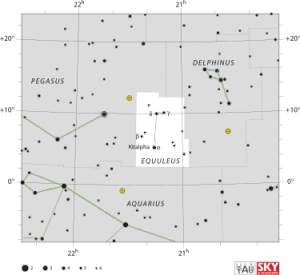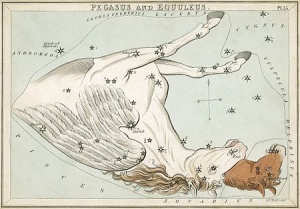Equuleus: Difference between revisions
No edit summary |
|||
| Line 4: | Line 4: | ||
==Mythology== | ==Mythology== | ||
[[File:Sidney Hall - Urania's Mirror - Pegasus and Equuleus (best currently available version - 2014).jpg|thumb|File:Sidney Hall - Urania's Mirror - Pegasus and Equuleus (best currently available version - 2014).jpg]] | [[File:Sidney Hall - Urania's Mirror - Pegasus and Equuleus (best currently available version - 2014).jpg|thumb|File:Sidney Hall - Urania's Mirror - Pegasus and Equuleus (best currently available version - 2014).jpg]] | ||
In Greek mythology, one myth associates Equuleus with the foal Celeris (meaning "swiftness" or "speed"), who was the offspring or brother of the winged horse Pegasus. Celeris was given to Castor by Mercury. Other myths say that Equuleus is the horse struck from Poseidon's trident, during the contest between him and Athena when deciding which would be the superior. Because this section of stars rises before Pegasus, it is often called Equus Primus, or the First Horse. Equuleus is also linked to the story of Philyra and Saturn. | In Greek mythology, one myth associates Equuleus with the foal Celeris (meaning "swiftness" or "speed"), who was the offspring or brother of the winged horse Pegasus. Celeris was given to Castor by [[Mercury (Hermes)|Mercury]]. Other myths say that Equuleus is the horse struck from Poseidon's trident, during the contest between him and Athena when deciding which would be the superior. Because this section of stars rises before Pegasus, it is often called Equus Primus, or the First Horse. Equuleus is also linked to the story of Philyra and Saturn. | ||
Created by Hipparchus and included by Ptolemy, it abuts Pegasus; unlike the larger horse it is depicted as a horse's head alone. | Created by Hipparchus and included by Ptolemy, it abuts Pegasus; unlike the larger horse it is depicted as a horse's head alone. | ||
==Session References== | ==Session References== | ||
Revision as of 23:55, 16 March 2015

Equuleus is a constellation. Its name is Latin for 'little horse', a foal. It was one of the 48 constellations listed by the 2nd century astronomer Ptolemy, and remains one of the 88 modern constellations. It is the second smallest of the modern constellations (after Crux), spanning only 72 square degrees. It is also very faint, having no stars brighter than the fourth magnitude.[1]
Mythology

In Greek mythology, one myth associates Equuleus with the foal Celeris (meaning "swiftness" or "speed"), who was the offspring or brother of the winged horse Pegasus. Celeris was given to Castor by Mercury. Other myths say that Equuleus is the horse struck from Poseidon's trident, during the contest between him and Athena when deciding which would be the superior. Because this section of stars rises before Pegasus, it is often called Equus Primus, or the First Horse. Equuleus is also linked to the story of Philyra and Saturn.
Created by Hipparchus and included by Ptolemy, it abuts Pegasus; unlike the larger horse it is depicted as a horse's head alone.
Session References
HGS Sessions - Clearing Hyperspace Phantom Matrix - 3/12/2015 [2]
References
Found in HGS Manual on Page 108 Found in HGS Manual on Page 115

